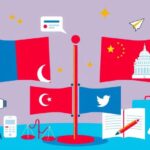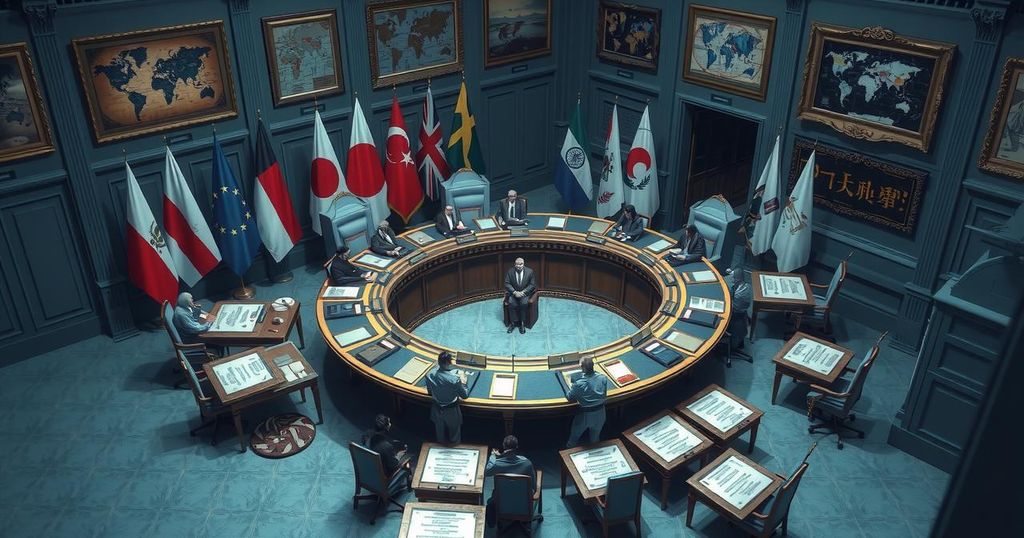Trump Considers Reducing China Tariffs If TikTok Sale Proceeds Before Deadline
President Trump is willing to consider reducing tariffs on China if a deal for TikTok’s U.S. operations is reached before the April 5 deadline. He has suggested potential equity stakes for the U.S. in any deal configuration, while Vice President JD Vance expressed the hope that a final agreement would materialize, despite potential challenges. Several bidders have shown interest in acquiring TikTok, with offers exceeding $30 billion.
On Wednesday, President Donald Trump expressed that he would contemplate reducing tariffs on China contingent upon the approval of a sale of TikTok’s U.S. operations. During a press interaction at the Oval Office, Trump remarked that this prospect “sounds like something I’d do.” This statement emerged shortly before an April deadline mandating TikTok’s parent company, ByteDance, to divest to avoid a U.S. ban.
The future of TikTok has been uncertain since the enactment of a law on January 19 requiring ByteDance to divest. Upon taking office, Trump granted TikTok a 75-day reprieve via an executive order postponing the enforcement of this statute to April 5. He reiterated that the deadline could potentially extend if required, having previously suggested that the U.S. might secure a 50% stake in a joint venture linked to TikTok, albeit without disclosing specific details concerning such a deal.
Earlier this month, Vice President JD Vance expressed optimism regarding the completion of a TikTok agreement before the early April deadline, although he acknowledged challenges that may delay finalization. Vance highlighted concerns over equity ownership and the extensive legal documentation necessary for a new joint venture, stating, “The deal itself will be very clear, but actually creating those thousands and thousands of pages of legal documents, that’s the one thing that I worry could slip.” TikTok and ByteDance have refrained from making public comments on these negotiations.
Should TikTok not be sold to a sanctioned buyer by April 5, the original law mandating a ban would be reinstated. However, the deadline for enforcement of the executive order is not definitively fixed, with Trump indicating the possibility of an extension. This order followed a Supreme Court ruling that obliged ByteDance to divest or face a ban in January. A mere day after this ruling, TikTok faced a brief blackout for U.S. users before relaunching following Trump’s pledge to postpone the ban.
In previous attempts, Trump sought to prohibit TikTok due to national security concerns; however, these moves were hampered by judicial interventions. His stance regarding the app shifted during last year’s presidential campaign, where he acknowledged its role in attracting younger voters. The decision to maintain TikTok’s operation via executive order has been met with scrutiny yet has not encountered any legal challenges.
While ByteDance’s intentions regarding the sale remain ambiguous, several entities have expressed interest in acquiring TikTok in recent months. Vance’s aides reached out to bidders including Perplexity AI, which proposed a merger of its operations with TikTok’s U.S. division. Additionally, a consortium spearheaded by billionaire Frank McCourt, alongside Reddit co-founder Alexis Ohanian, has reportedly offered $20 billion cash to purchase TikTok, intending to modernize the app with blockchain to enhance user control over their data. Furthermore, Jesse Tinsley, founder of Employer.com, has organized a consortium with a bid exceeding $30 billion, which includes Roblox’s CEO.
In summary, President Trump is open to tariff reductions on China contingent upon the sale of TikTok’s operations, with a looming April 5 deadline for ByteDance. While no definitive comments have been made by ByteDance regarding the sale, various bidders have emerged with substantial financial offers. The potential deal’s complexity raises concerns over legal documentation and equity ownership, highlighting the challenges ahead. As the deadline approaches, the possibility for extensions remains, shaping the ongoing discourse surrounding TikTok’s future.
Original Source: www.detroitnews.com








Post Comment